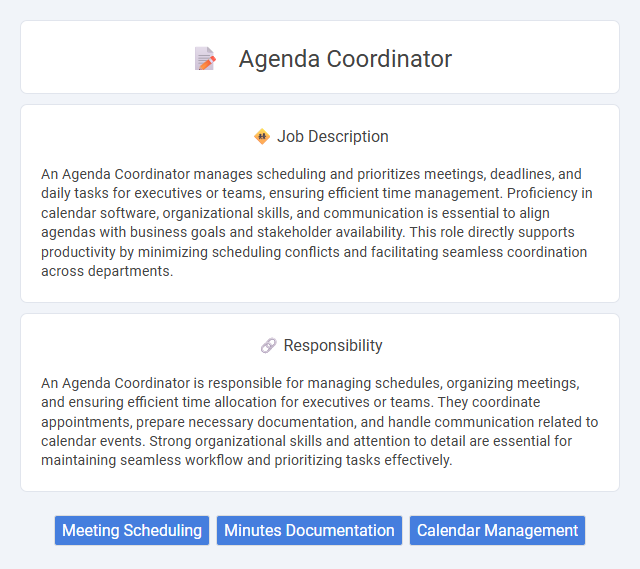
An Agenda Coordinator manages scheduling and prioritizes meetings, deadlines, and daily tasks for executives or teams, ensuring efficient time management. Proficiency in calendar software, organizational skills, and communication is essential to align agendas with business goals and stakeholder availability. This role directly supports productivity by minimizing scheduling conflicts and facilitating seamless coordination across departments.
Individuals who are highly organized, detail-oriented, and capable of managing multiple tasks simultaneously are more likely suited for the role of Agenda Coordinator. Those who thrive in fast-paced environments and possess strong communication skills probably find this job compatible with their abilities. Conversely, people who struggle with time management or prefer less structured work settings might not be well-suited for this position.
Qualification
An Agenda Coordinator must possess strong organizational and time-management skills, with proficiency in scheduling software such as Microsoft Outlook and Google Calendar. Excellent communication abilities and attention to detail are essential for managing appointments, meetings, and deadlines effectively. Prior experience in administrative roles and a minimum of a high school diploma or equivalent often serve as baseline qualifications for this position.
Responsibility
An Agenda Coordinator is responsible for managing schedules, organizing meetings, and ensuring efficient time allocation for executives or teams. They coordinate appointments, prepare necessary documentation, and handle communication related to calendar events. Strong organizational skills and attention to detail are essential for maintaining seamless workflow and prioritizing tasks effectively.
Benefit
An Agenda Coordinator likely enhances organizational efficiency by managing schedules and prioritizing tasks, which could lead to increased productivity. Effective coordination may also reduce missed deadlines and improve communication among team members. This role probably supports smoother workflow and time management, benefiting both individuals and overall business operations.
Challenge
Managing an agenda coordinator role probably involves balancing multiple priorities under tight deadlines, which can be quite challenging. The likelihood of needing to adapt quickly to sudden schedule changes or conflicting demands is high, requiring strong organizational and problem-solving skills. Handling unexpected interruptions and maintaining clear communication with team members might often test one's ability to stay calm and efficient.
Career Advancement
An Agenda Coordinator plays a vital role in managing schedules, organizing meetings, and ensuring efficient time allocation for executives or teams. Mastery in communication, time management, and organizational tools can lead to career advancement opportunities such as Executive Assistant, Project Manager, or Operations Coordinator. Developing skills in strategic planning and stakeholder coordination significantly enhances professional growth within corporate environments.
Key Terms
Meeting Scheduling
An Agenda Coordinator specializes in efficient meeting scheduling to optimize organizational productivity. They manage calendars, coordinate availability among participants, and ensure timely communication of meeting details. Proficiency in scheduling software and strong organizational skills are essential to minimize conflicts and enhance workflow.
Minutes Documentation
Agenda Coordinators specialize in managing meeting schedules and meticulously capturing minutes documentation to ensure comprehensive records of discussions and decisions. They utilize advanced transcription tools and standardized templates to create accurate, clear, and concise minutes that support organizational accountability and follow-up actions. Expertise in time management and attention to detail enhances the effectiveness of minutes as official communication and reference materials.
Calendar Management
An Agenda Coordinator specializes in advanced calendar management, ensuring seamless scheduling for executives and teams by prioritizing appointments and resolving conflicts efficiently. They utilize digital tools like Microsoft Outlook, Google Calendar, and scheduling software to optimize time allocation and enhance productivity. Expertise in coordinating meetings across different time zones and managing last-minute changes is essential to maintain organizational flow and meet critical deadlines.
 kuljobs.com
kuljobs.com